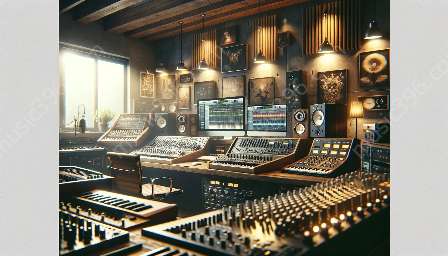Music recording and production have undergone significant changes throughout history, influenced in large part by the advent of new technology. At the same time, ethical considerations have played a crucial role in ensuring that the music industry remains fair, respectful, and responsible. In this topic cluster, we will explore the intersection of technology and ethics in music recording and production, taking a closer look at the historical context, the impact of technology, and the ethical considerations that are involved.
History and Evolution of Music Recording Technology
The history of music recording technology is a captivating tale of innovation, creativity, and progress. It all began with the invention of the phonograph by Thomas Edison in the late 19th century. This revolutionary device marked the birth of the music recording industry, enabling sound to be captured and reproduced for the first time in history.
Over the years, numerous advancements have transformed the landscape of music recording and production. From cassette tapes and vinyl records to CDs, MP3s, and streaming services, each technological leap has had a profound impact on how music is recorded, consumed, and distributed.
Throughout this evolution, ethical considerations have become increasingly important. As music recording technology has become more sophisticated, questions about ownership, creative control, and copyright have arisen. The ethical implications of how music is created, marketed, and monetized have become central to discussions within the industry.
Impact of Technology on Music Recording
The impact of technology on music recording has been multifaceted. On one hand, technological advancements have enabled unprecedented levels of creativity, allowing artists and producers to experiment with new sounds and production techniques. The digital revolution has democratized music recording, making it more accessible to a wider range of musicians and producers. This has led to a more diverse and inclusive music landscape, providing opportunities for voices that may have previously been unheard.
However, the proliferation of technology has also brought about ethical challenges. The ease of digital manipulation has raised concerns about authenticity and integrity in music production. Questions about the use of auto-tune, sample clearance, and the manipulation of vocal performances have prompted discussions about the ethical boundaries of music recording and production.
Ethical Considerations in Music Recording and Production
As technology continues to shape the music industry, ethical considerations have become increasingly complex. Issues such as fair compensation for artists, the protection of intellectual property, and the representation of diverse voices have come to the forefront of ethical discussions.
One of the most significant ethical considerations in music recording and production is the fair compensation of artists and creators. With the rise of streaming services, the debate over royalty rates and fair pay for musicians has become a divisive issue. Ensuring that artists receive equitable compensation for their work is vital to the sustainability of the music industry.
Moreover, the ethical implications of intellectual property and copyright have become more pronounced in the digital age. The ease of sharing and distributing music online has raised questions about the protection of artistic works and the enforcement of copyright laws. Efforts to combat piracy and unauthorized use of music have become essential to safeguarding the rights of creators.
Representation and diversity are also crucial ethical considerations in music recording and production. The industry has increasingly recognized the need to elevate and amplify underrepresented voices. Ethical practices in music production involve promoting inclusivity and providing opportunities for marginalized artists and communities.
Conclusion
In conclusion, the intersection of technology and ethics in music recording and production is a dynamic and evolving landscape. The history and evolution of music recording technology have shaped the industry in profound ways, while ethical considerations have become integral to ensuring fairness, respect, and responsibility within the music industry. As technology continues to advance, it is essential for the industry to address ethical considerations proactively, supporting the rights of artists, promoting diversity, and upholding the integrity of creative expression.



































